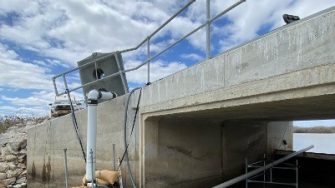Improving fish passage on Australian rivers
UNSW Humanitarian Engineering grant
UNSW Humanitarian Engineering grant

UNSW Engineering PhD student Hiruni Kammanakada is installing a novel fishway at Australian weirs to try and transport freshwater fish over in-stream barriers. Rivers across the world are heavily regulated by hydraulic structures, like dams and weirs. Key migration paths for freshwater fish are rapidly becoming blocked, resulting in a worldwide decline in freshwater fish populations. The UNSW Tube Fishway is a new way of transporting fish past these barriers, using tubes.
On the Murrumbidgee River lies the Gayini Wetlands - the largest remaining wetlands in the Murrumbidgee Valley. The wetlands are managed by the traditional owners, the Nari Nari Tribal Council, alongside the UNSW Centre of Ecosystem Science & The Nature Conservancy.
Using her UNSW Humanitarian Engineering grant, Hiruni was able to engage the services of the Gayini River Rangers and buy field equipment for her experimentation with the Tube Fishway.
The team successfully installed and operated the Tube Fishway at Bala regulator in the Gayini Wetlands. This preliminary deployment forms the basis for any future permanent installations. If deployed correctly, this technology will enable fish migration, improve fish breeding conditions and increase native fish populations.
The impacts of a healthy fish populations would cascade through the wetlands, improving water quality, increasing food stocks for waterbirds, and improving the overall ecosystem.